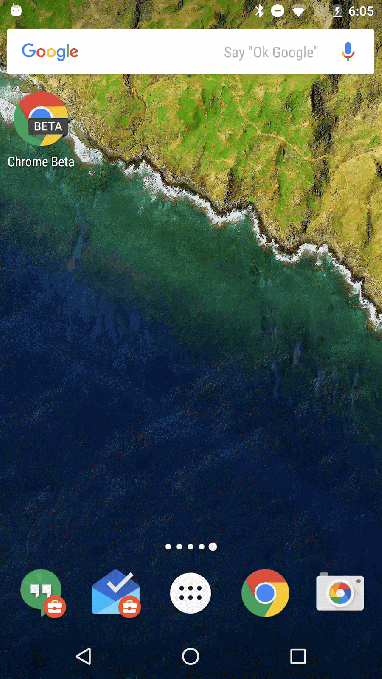Google Chrome For Android Will Soon Support Interactions With Bluetooth Beacons - Google reported today that it has started to bolster physical reference points in its Chrome program for Android.

The component, which has been tried in the iOS application since the previous summer, is going to Chrome 49 for Android soon. The element empowers clients to select into cooperate with and get content from close-by bluetooth-empowered reference points openly puts like shops, games stadiums, schools, and so on.
Backing is at first going to the beta form of Chrome for Android, so it'll simply hit a determination of the application's aggregate userbase at to start with, yet it will take off to the steady form after some time.
Physical signals offer an alternate showcasing approach for organizations that is just barely being acknowledged today. Google's blog entry highlights various cases as of now, including how a school utilizes signals to convey class notes, how reference points were sent at CES to supplant promoting handouts, and how Golden State Warriors' passes highlight recordings to fans over the air. That is truly simply the surface being scratched at this moment, and empowering reference point association in Chrome for both iOS and Android is a noteworthy stride to opening future open doors.
Reference points are prone to be an intriguing issue in 2016, and there are various tech organizations spearheading the idea with equipment and programming. Estimote, the organization reputed to be working with retail monster Target, as of late shut a $10.7 million Series A round, while there's SoftBank-supported Swirl Networks, which raised a $18 million Series C a year ago, and Gimbal, a signal organization that was spun out of tech goliath Qualcomm in 2014, in the blend, as well.
That is very all from Google today, however. Encouraging its push into associating the physical and online universes, Google has made an Internet of Things (IoT) Technology Research Award Pilot.
Refering to challenges around interoperability, client protection, and overseeing association, Google said it is welcoming college specialists to take part in the pilot by means of four to eight week tests. Would-be takers have until the end of February to present their recommendations for examination.
The component, which has been tried in the iOS application since the previous summer, is going to Chrome 49 for Android soon. The element empowers clients to select into cooperate with and get content from close-by bluetooth-empowered reference points openly puts like shops, games stadiums, schools, and so on.
Backing is at first going to the beta form of Chrome for Android, so it'll simply hit a determination of the application's aggregate userbase at to start with, yet it will take off to the steady form after some time.
Physical signals offer an alternate showcasing approach for organizations that is just barely being acknowledged today. Google's blog entry highlights various cases as of now, including how a school utilizes signals to convey class notes, how reference points were sent at CES to supplant promoting handouts, and how Golden State Warriors' passes highlight recordings to fans over the air. That is truly simply the surface being scratched at this moment, and empowering reference point association in Chrome for both iOS and Android is a noteworthy stride to opening future open doors.
Reference points are prone to be an intriguing issue in 2016, and there are various tech organizations spearheading the idea with equipment and programming. Estimote, the organization reputed to be working with retail monster Target, as of late shut a $10.7 million Series A round, while there's SoftBank-supported Swirl Networks, which raised a $18 million Series C a year ago, and Gimbal, a signal organization that was spun out of tech goliath Qualcomm in 2014, in the blend, as well.
That is very all from Google today, however. Encouraging its push into associating the physical and online universes, Google has made an Internet of Things (IoT) Technology Research Award Pilot.
Refering to challenges around interoperability, client protection, and overseeing association, Google said it is welcoming college specialists to take part in the pilot by means of four to eight week tests. Would-be takers have until the end of February to present their recommendations for examination.

Comments
Post a Comment